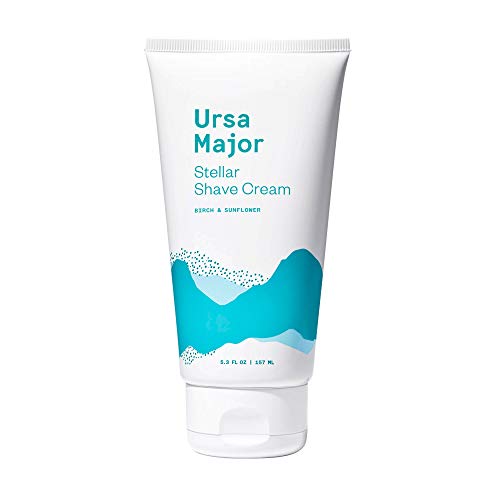
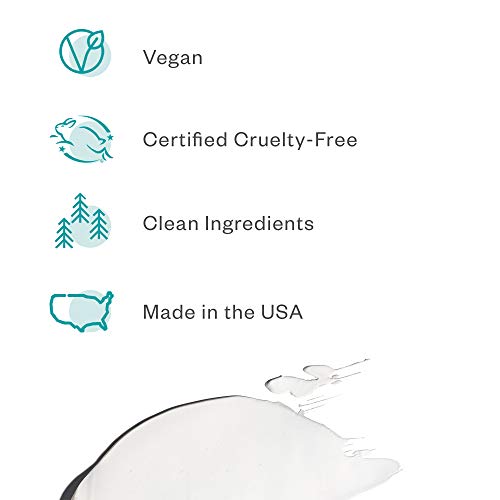
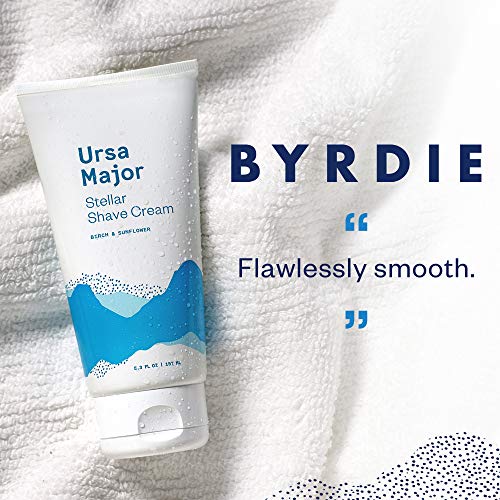
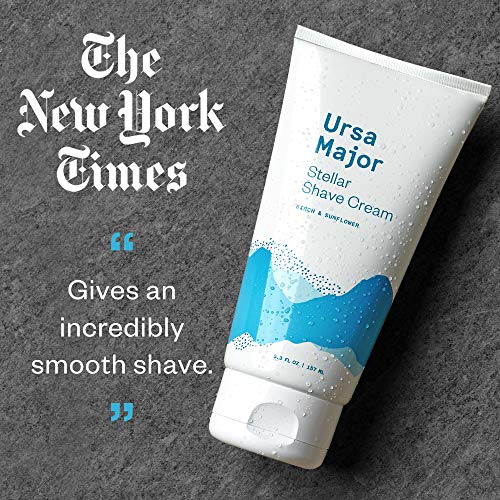
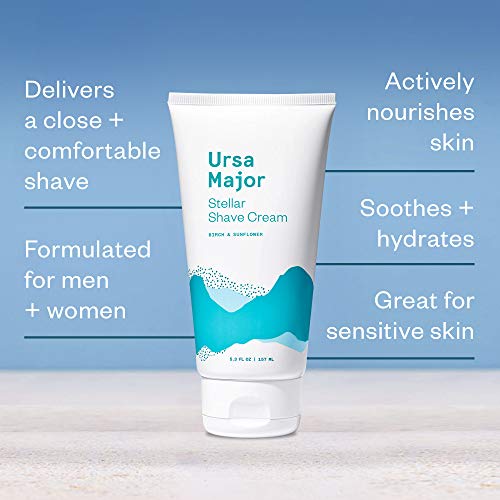
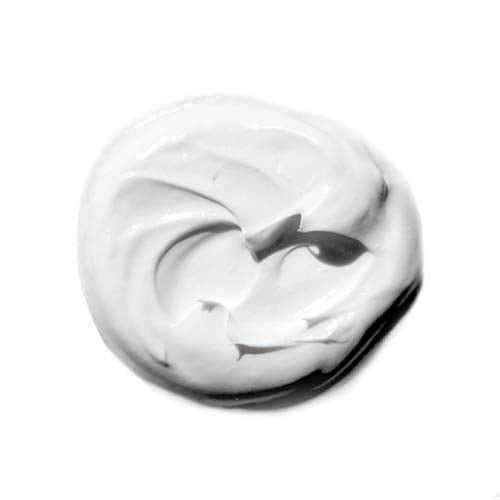
Ursa Major Natural Shave Cream - Non-Irritating, Vegan, Nourishing Formula for All - 5.3oz


Zinc Oxide(sunscreen Grade)
Medium RiskZinc oxide (sunscreen grade) is a mineral compound often used in sunscreens for its ability to provide broad-spectrum UV protection. It is micronized to improve its cosmetic feel and skin application, making it suitable for various formulations, including those designed for sensitive skin.
Sustai Insights
Zinc oxide offers effective UV protection and is generally considered safe for topical use; however, it has moderate concerns related to allergies and potential skin absorption. Regulatory bodies have noted use restrictions, particularly in specific formulations. While its environmental impact is relatively low, concerns about enhanced skin absorption warrant caution. Overall, the risk level is assessed as medium, and users are advised to follow safe application practices. Alternatives such as titanium dioxide may provide similar benefits with potentially lower allergenic risks.
Vetiveria Zizanioides Root Oil
Medium RiskVetiveria zizanioides root oil is a volatile oil derived from the roots of the vetiver plant. It is primarily used for its aromatic properties in perfumes and cosmetics, as well as for its potential therapeutic benefits in aromatherapy and traditional medicine.
Sustai Insights
Vetiveria zizanioides root oil offers functional benefits as a fragrance and may have calming effects in aromatherapy. It is generally considered low risk for carcinogenicity and developmental toxicity but poses moderate concerns for allergies. Environmentally, it is not known to be bioaccumulative, and its production is often sustainable. Regulatory statuses are favorable, with no current restrictions. Overall, while it has beneficial properties, the moderate allergy risk necessitates caution in sensitive populations, leading to a medium risk assessment.
Arachidyl Glucoside
Medium RiskArachidyl glucoside is a product obtained by the glycosylation of arachidyl alcohol, commonly used as an emulsifier and surfactant in cosmetic formulations. It helps to stabilize and enhance the texture of products, improving spreadability and skin feel.
Sustai Insights
Arachidyl glucoside offers functional benefits as an emulsifier in formulations, enhancing product stability. It is considered to have low health risks related to cancer, allergies, and reproductive toxicity. However, concerns about endocrine disruption have been noted, warranting cautious use. Environmentally, it poses low bioaccumulation risk and is not classified as a significant pollutant. Regulatory assessments indicate no major restrictions. Overall, the risk level is categorized as medium, suggesting careful consideration in formulation and use, with potential alternatives available for enhanced safety.
Citrus Paradisi (Grapefruit) Oil
Medium RiskCitrus paradisi (grapefruit) oil is an essential oil derived from the peel of grapefruit. It is commonly used in personal care products for its fragrance and potential antibacterial properties. It is also utilized in aromatherapy and cosmetic formulations for its refreshing scent.
Sustai Insights
Citrus paradisi oil offers functional benefits such as fragrance enhancement and potential antimicrobial properties. However, it presents a high allergenic potential, which may cause skin irritation or allergic reactions in sensitive individuals. Environmental concerns include its persistence and bioaccumulation. Regulatory advisories exist that restrict its use in certain products, leading to an overall moderate risk assessment. Safe usage practices should be followed to minimize health risks, and alternatives such as essential oils with lower allergenic profiles could be considered.
Abies Balsamea (Balsam) Oil
Low RiskAbies balsamea (balsam) oil is an essential oil derived from the balsam fir tree. It is commonly used in personal care products for its aromatic properties and potential antimicrobial effects. This oil may also serve as a natural fragrance component.
Sustai Insights
Balsam oil is valued for its functional benefits, including antimicrobial properties and aroma enhancement in products. It is sustainably sourced and biodegradable. Health risks are low, with minimal concerns regarding carcinogenicity, allergies, or reproductive toxicity. Environmental risks are also low, with no significant pollutant or bioaccumulation potential reported. Regulatory bodies do not currently restrict its use. Overall, the risk level associated with balsam oil is low, making it a suitable ingredient in personal care formulations. Safe usage practices should be followed, and alternatives like cedarwood oil can be considered.
Sodium Arachidate
Low RiskSodium arachidate is a sodium salt derived from arachidic acid, primarily used as an emulsifier and thickening agent in cosmetic and personal care products. It contributes to the stability and texture of formulations, enhancing the overall product performance.
Sustai Insights
Sodium arachidate offers functional benefits as an emulsifier, effectively stabilizing formulations and improving texture. It is considered low risk regarding health concerns, with no significant evidence of carcinogenicity, allergenic potential, or reproductive toxicity. Environmentally, it is not recognized as a pollutant or bioaccumulative. Regulatory bodies do not impose restrictions on its use, affirming its safety profile. Overall, it presents a low risk, making it a suitable ingredient in cosmetic applications. For alternatives, options like stearic acid or other plant-derived emulsifiers may be considered.
Salix Nigra (Black Willow) Bark Extract
Low RiskSalix nigra (black willow) bark extract is an extract derived from the bark of the black willow tree. It is commonly used in cosmetic and personal care products for its potential soothing properties and is recognized for its role in traditional medicine.
Sustai Insights
Salix nigra (black willow) bark extract offers functional benefits such as anti-inflammatory and soothing effects on the skin, making it useful in various formulations. It is sustainably sourced and biodegradable. Health risks associated with this ingredient are low, with no significant concerns regarding carcinogenicity, allergies, or reproductive toxicity. Environmental risks are minimal, and it is not subject to any restrictions from regulatory agencies. Overall, the ingredient is assessed as low risk, with safe usage practices encouraged. Alternative botanical extracts may provide similar benefits.
Cetearyl Glucoside
Low RiskCetearyl glucoside is a surfactant and emulsifier derived from natural sources, commonly used in cosmetic and personal care products to stabilize formulations and enhance texture. It helps to blend oil and water-based ingredients, improving product consistency and application.
Sustai Insights
Cetearyl glucoside offers functional benefits as an effective emulsifier and surfactant, facilitating product stability. Its sustainability credentials are notable, as it is biodegradable and sourced from renewable materials. Health risks are generally low, with minimal concerns for irritation and allergies. Environmental impacts are also low, posing no significant pollution or bioaccumulation risks. Regulatory status remains positive with no major restrictions reported. Safe usage practices are advised, and alternatives such as plant-derived emulsifiers may be considered. Overall, the risk level associated with cetearyl glucoside is low.
Zingiber Officinale (Ginger) Root Oil
Low RiskZingiber officinale (ginger) root oil is obtained from the rhizome of the ginger plant. It is commonly used in various products for its aromatic properties and potential health benefits. The oil contains bioactive compounds that may contribute to its effectiveness in formulations.
Sustai Insights
Zingiber officinale (ginger) root oil serves as a natural fragrance and may provide anti-inflammatory benefits. It is sustainably sourced and considered biodegradable. Health risks are low, with minimal concerns regarding carcinogenicity, allergenicity, or reproductive toxicity. Environmental impact is negligible, and regulatory status is compliant with current guidelines. Overall, the ingredient presents a low risk profile, making it a suitable choice in formulations.
Avena Sativa (Oat) Kernel Protein
Low RiskAvena sativa (oat) kernel protein is a protein derived from oats, commonly used in cosmetic formulations for its moisturizing and film-forming properties. It is known for its ability to enhance skin hydration and improve product texture, making it a popular ingredient in skin and hair care products.
Sustai Insights
Avena sativa (oat) kernel protein offers functional benefits such as hydration and improved product texture, contributing positively to cosmetic formulations. It is considered to have low health risks, with no significant concerns regarding carcinogenicity, allergies, or reproductive toxicity. Environmentally, it is not recognized as a pollutant or bioaccumulative. Regulatory bodies do not impose significant restrictions on its use. Overall, the risk level associated with this ingredient is low, and its use in products is generally safe. Alternatives include other plant-based proteins that provide similar benefits.
Vegetarian Glycerin
Low RiskVegetarian glycerin, also known as glycerol, is a colorless, odorless, and viscous liquid derived from plant sources. It is primarily used as a humectant, solvent, and emollient in various personal care products, helping to retain moisture and improve texture.
Sustai Insights
Vegetarian glycerin offers functional benefits as an effective humectant, promoting hydration and skin smoothness. It is biodegradable and typically sustainably sourced. Health risks associated with glycerin are low, with no significant concerns for carcinogenicity, allergens, or reproductive toxicity. Environmental risks are minimal, and it is not subject to major regulatory warnings. Overall, the risk level for this ingredient is low, making it a safe choice in formulations. Safe usage practices include ensuring proper concentrations in products, and alternatives such as propylene glycol exist but may have differing properties.
Water
Low RiskWater is a clear, colorless liquid essential for various biological processes. It serves as a solvent in formulations, facilitating the dissolution of other ingredients and enhancing product texture and application. Additionally, water plays a crucial role in hydration and is a key component in many cosmetic and personal care products.
Sustai Insights
Water is an effective solvent and hydrator, contributing to the texture and efficacy of formulations. It is biodegradable and generally regarded as safe, with low concerns regarding carcinogenicity, allergies, and reproductive toxicity. However, excessive water usage can lead to environmental concerns, particularly regarding resource depletion. Regulatory bodies do not impose restrictions on water use in cosmetics. Overall, the risks associated with water are low, making it a safe and essential ingredient.
Betula Alba (Birch) Sap
Low RiskBetula alba (birch) sap is the fluid extracted from the birch tree, primarily used in cosmetic and personal care products for its hydrating and soothing properties. It serves as a natural humectant, helping to retain moisture in the skin.
Sustai Insights
Betula alba sap offers functional benefits as a moisturizer and skin conditioner, reflecting sustainable sourcing practices. Health risks are minimal, with low concerns regarding carcinogenicity, allergies, and reproductive toxicity. Environmental impacts are also low, as it is not considered a pollutant or bioaccumulative. Regulatory bodies do not impose significant restrictions on its use. Overall, the risk level associated with Betula alba sap is low, making it a favorable ingredient in formulations, with no notable safer alternatives required.
Cetearyl Alcohol
Low RiskCetearyl alcohol is a mixture of cetyl and stearyl alcohol, primarily used as an emulsifier and thickener in cosmetic formulations. It helps stabilize products, improve texture, and enhance moisturizing properties, making it common in creams and lotions.
Sustai Insights
Cetearyl alcohol offers functional benefits as an effective emulsifier and skin-conditioning agent, contributing to product stability and texture. It is generally recognized as safe, with low concerns for carcinogenicity, allergies, or reproductive toxicity. Environmental risks are minimal, as it is biodegradable and has low pollutant potential. Regulatory bodies have not imposed significant restrictions on its use. Overall, cetearyl alcohol is assessed to carry low risk, making it a suitable ingredient choice in cosmetic products.
Behenyl Alcohol
Low RiskBehensyl alcohol is a saturated fatty alcohol obtained from the seeds of the Ben oil plant. It is primarily used as an emollient, emulsifier, and thickening agent in various cosmetic and personal care formulations.
Sustai Insights
Behensyl alcohol offers functional benefits such as improving product texture and stability. It is considered to have low health risks, with minimal concerns regarding carcinogenicity, allergies, and reproductive toxicity. Environmentally, it poses low risks as a pollutant and is not bioaccumulative. Regulatory bodies have not issued significant warnings. Overall, it is assessed to have a low risk profile. Safe usage involves adhering to recommended concentrations, and potential alternatives include other fatty alcohols that may provide similar benefits.
Helianthus Annuus (Sunflower) Seed
Low RiskHelianthus annuus (sunflower) seed is derived from the seeds of the sunflower plant and is commonly used in various cosmetic and personal care products. It serves primarily as an emollient and skin conditioning agent, providing moisture and enhancing the texture of formulations.
Sustai Insights
Helianthus annuus (sunflower) seed offers functional benefits, including skin conditioning and moisturizing properties, while being sustainably sourced and biodegradable. Health risks are minimal, with low concerns for carcinogenicity, allergies, and reproductive toxicity. Environmentally, it presents low risks of pollution or bioaccumulation. Regulatory assessments indicate no current restrictions. Overall, it is considered a low-risk ingredient, and safe usage practices should be maintained. Alternative ingredients may include other plant-based oils, but the sunflower seed oil remains a viable option.
Crithmum Maritimum (Sea Fennel) Extract
Low RiskCrithmum maritimum extract is derived from sea fennel, a coastal plant known for its resilience to saline environments. This extract is often utilized in cosmetic and skincare formulations for its potential benefits in hydration and skin conditioning.
Sustai Insights
Crithmum maritimum extract offers functional benefits such as moisturizing and skin conditioning properties, contributing to product efficacy. It is derived from a naturally occurring plant, suggesting sustainable sourcing. Health risks are minimal, with low concerns regarding carcinogenicity, allergies, or reproductive toxicity. Environmental impacts appear limited, with no significant pollutant or bioaccumulation potential. Currently, there are no regulatory restrictions on its use, reflecting a low-risk profile overall. For those seeking alternatives, other plant extracts with similar benefits may be considered.
Galactoarabinan
Low RiskGalactoarabinan is a polysaccharide obtained from the larch tree and is commonly used in cosmetic and personal care products. It acts as a humectant and thickening agent, contributing to product texture and moisture retention.
Sustai Insights
Galactoarabinan serves functional benefits as a humectant and thickening agent, enhancing product texture while retaining moisture. It is biodegradable and derived from renewable sources, supporting sustainability. Health risks are low, with no significant concerns regarding carcinogenicity, allergies, or reproductive toxicity. Environmental risks are minimal, as it does not contribute significantly to pollution or bioaccumulation. Regulatory status is favorable, with no current restrictions. Overall, this ingredient is assessed as low risk, making it a suitable choice in formulations.
Zinc Oxide(sunscreen Grade)
Medium RiskZinc oxide (sunscreen grade) is a mineral compound often used in sunscreens for its ability to provide broad-spectrum UV protection. It is micronized to improve its cosmetic feel and skin application, making it suitable for various formulations, including those designed for sensitive skin.
Sustai Insights
Zinc oxide offers effective UV protection and is generally considered safe for topical use; however, it has moderate concerns related to allergies and potential skin absorption. Regulatory bodies have noted use restrictions, particularly in specific formulations. While its environmental impact is relatively low, concerns about enhanced skin absorption warrant caution. Overall, the risk level is assessed as medium, and users are advised to follow safe application practices. Alternatives such as titanium dioxide may provide similar benefits with potentially lower allergenic risks.
Vetiveria Zizanioides Root Oil
Medium RiskVetiveria zizanioides root oil is a volatile oil derived from the roots of the vetiver plant. It is primarily used for its aromatic properties in perfumes and cosmetics, as well as for its potential therapeutic benefits in aromatherapy and traditional medicine.
Sustai Insights
Vetiveria zizanioides root oil offers functional benefits as a fragrance and may have calming effects in aromatherapy. It is generally considered low risk for carcinogenicity and developmental toxicity but poses moderate concerns for allergies. Environmentally, it is not known to be bioaccumulative, and its production is often sustainable. Regulatory statuses are favorable, with no current restrictions. Overall, while it has beneficial properties, the moderate allergy risk necessitates caution in sensitive populations, leading to a medium risk assessment.
Abies Balsamea (Balsam) Oil
Low RiskAbies balsamea (balsam) oil is an essential oil derived from the balsam fir tree. It is commonly used in personal care products for its aromatic properties and potential antimicrobial effects. This oil may also serve as a natural fragrance component.
Sustai Insights
Balsam oil is valued for its functional benefits, including antimicrobial properties and aroma enhancement in products. It is sustainably sourced and biodegradable. Health risks are low, with minimal concerns regarding carcinogenicity, allergies, or reproductive toxicity. Environmental risks are also low, with no significant pollutant or bioaccumulation potential reported. Regulatory bodies do not currently restrict its use. Overall, the risk level associated with balsam oil is low, making it a suitable ingredient in personal care formulations. Safe usage practices should be followed, and alternatives like cedarwood oil can be considered.
Sodium Arachidate
Low RiskSodium arachidate is a sodium salt derived from arachidic acid, primarily used as an emulsifier and thickening agent in cosmetic and personal care products. It contributes to the stability and texture of formulations, enhancing the overall product performance.
Sustai Insights
Sodium arachidate offers functional benefits as an emulsifier, effectively stabilizing formulations and improving texture. It is considered low risk regarding health concerns, with no significant evidence of carcinogenicity, allergenic potential, or reproductive toxicity. Environmentally, it is not recognized as a pollutant or bioaccumulative. Regulatory bodies do not impose restrictions on its use, affirming its safety profile. Overall, it presents a low risk, making it a suitable ingredient in cosmetic applications. For alternatives, options like stearic acid or other plant-derived emulsifiers may be considered.
Salix Nigra (Black Willow) Bark Extract
Low RiskSalix nigra (black willow) bark extract is an extract derived from the bark of the black willow tree. It is commonly used in cosmetic and personal care products for its potential soothing properties and is recognized for its role in traditional medicine.
Sustai Insights
Salix nigra (black willow) bark extract offers functional benefits such as anti-inflammatory and soothing effects on the skin, making it useful in various formulations. It is sustainably sourced and biodegradable. Health risks associated with this ingredient are low, with no significant concerns regarding carcinogenicity, allergies, or reproductive toxicity. Environmental risks are minimal, and it is not subject to any restrictions from regulatory agencies. Overall, the ingredient is assessed as low risk, with safe usage practices encouraged. Alternative botanical extracts may provide similar benefits.
Cetearyl Glucoside
Low RiskCetearyl glucoside is a surfactant and emulsifier derived from natural sources, commonly used in cosmetic and personal care products to stabilize formulations and enhance texture. It helps to blend oil and water-based ingredients, improving product consistency and application.
Sustai Insights
Cetearyl glucoside offers functional benefits as an effective emulsifier and surfactant, facilitating product stability. Its sustainability credentials are notable, as it is biodegradable and sourced from renewable materials. Health risks are generally low, with minimal concerns for irritation and allergies. Environmental impacts are also low, posing no significant pollution or bioaccumulation risks. Regulatory status remains positive with no major restrictions reported. Safe usage practices are advised, and alternatives such as plant-derived emulsifiers may be considered. Overall, the risk level associated with cetearyl glucoside is low.
Zingiber Officinale (Ginger) Root Oil
Low RiskZingiber officinale (ginger) root oil is obtained from the rhizome of the ginger plant. It is commonly used in various products for its aromatic properties and potential health benefits. The oil contains bioactive compounds that may contribute to its effectiveness in formulations.
Sustai Insights
Zingiber officinale (ginger) root oil serves as a natural fragrance and may provide anti-inflammatory benefits. It is sustainably sourced and considered biodegradable. Health risks are low, with minimal concerns regarding carcinogenicity, allergenicity, or reproductive toxicity. Environmental impact is negligible, and regulatory status is compliant with current guidelines. Overall, the ingredient presents a low risk profile, making it a suitable choice in formulations.
Avena Sativa (Oat) Kernel Protein
Low RiskAvena sativa (oat) kernel protein is a protein derived from oats, commonly used in cosmetic formulations for its moisturizing and film-forming properties. It is known for its ability to enhance skin hydration and improve product texture, making it a popular ingredient in skin and hair care products.
Sustai Insights
Avena sativa (oat) kernel protein offers functional benefits such as hydration and improved product texture, contributing positively to cosmetic formulations. It is considered to have low health risks, with no significant concerns regarding carcinogenicity, allergies, or reproductive toxicity. Environmentally, it is not recognized as a pollutant or bioaccumulative. Regulatory bodies do not impose significant restrictions on its use. Overall, the risk level associated with this ingredient is low, and its use in products is generally safe. Alternatives include other plant-based proteins that provide similar benefits.
Arachidyl Glucoside
Medium RiskArachidyl glucoside is a product obtained by the glycosylation of arachidyl alcohol, commonly used as an emulsifier and surfactant in cosmetic formulations. It helps to stabilize and enhance the texture of products, improving spreadability and skin feel.
Sustai Insights
Arachidyl glucoside offers functional benefits as an emulsifier in formulations, enhancing product stability. It is considered to have low health risks related to cancer, allergies, and reproductive toxicity. However, concerns about endocrine disruption have been noted, warranting cautious use. Environmentally, it poses low bioaccumulation risk and is not classified as a significant pollutant. Regulatory assessments indicate no major restrictions. Overall, the risk level is categorized as medium, suggesting careful consideration in formulation and use, with potential alternatives available for enhanced safety.
Vegetarian Glycerin
Low RiskVegetarian glycerin, also known as glycerol, is a colorless, odorless, and viscous liquid derived from plant sources. It is primarily used as a humectant, solvent, and emollient in various personal care products, helping to retain moisture and improve texture.
Sustai Insights
Vegetarian glycerin offers functional benefits as an effective humectant, promoting hydration and skin smoothness. It is biodegradable and typically sustainably sourced. Health risks associated with glycerin are low, with no significant concerns for carcinogenicity, allergens, or reproductive toxicity. Environmental risks are minimal, and it is not subject to major regulatory warnings. Overall, the risk level for this ingredient is low, making it a safe choice in formulations. Safe usage practices include ensuring proper concentrations in products, and alternatives such as propylene glycol exist but may have differing properties.
Water
Low RiskWater is a clear, colorless liquid essential for various biological processes. It serves as a solvent in formulations, facilitating the dissolution of other ingredients and enhancing product texture and application. Additionally, water plays a crucial role in hydration and is a key component in many cosmetic and personal care products.
Sustai Insights
Water is an effective solvent and hydrator, contributing to the texture and efficacy of formulations. It is biodegradable and generally regarded as safe, with low concerns regarding carcinogenicity, allergies, and reproductive toxicity. However, excessive water usage can lead to environmental concerns, particularly regarding resource depletion. Regulatory bodies do not impose restrictions on water use in cosmetics. Overall, the risks associated with water are low, making it a safe and essential ingredient.
Citrus Paradisi (Grapefruit) Oil
Medium RiskCitrus paradisi (grapefruit) oil is an essential oil derived from the peel of grapefruit. It is commonly used in personal care products for its fragrance and potential antibacterial properties. It is also utilized in aromatherapy and cosmetic formulations for its refreshing scent.
Sustai Insights
Citrus paradisi oil offers functional benefits such as fragrance enhancement and potential antimicrobial properties. However, it presents a high allergenic potential, which may cause skin irritation or allergic reactions in sensitive individuals. Environmental concerns include its persistence and bioaccumulation. Regulatory advisories exist that restrict its use in certain products, leading to an overall moderate risk assessment. Safe usage practices should be followed to minimize health risks, and alternatives such as essential oils with lower allergenic profiles could be considered.
Betula Alba (Birch) Sap
Low RiskBetula alba (birch) sap is the fluid extracted from the birch tree, primarily used in cosmetic and personal care products for its hydrating and soothing properties. It serves as a natural humectant, helping to retain moisture in the skin.
Sustai Insights
Betula alba sap offers functional benefits as a moisturizer and skin conditioner, reflecting sustainable sourcing practices. Health risks are minimal, with low concerns regarding carcinogenicity, allergies, and reproductive toxicity. Environmental impacts are also low, as it is not considered a pollutant or bioaccumulative. Regulatory bodies do not impose significant restrictions on its use. Overall, the risk level associated with Betula alba sap is low, making it a favorable ingredient in formulations, with no notable safer alternatives required.
Cetearyl Alcohol
Low RiskCetearyl alcohol is a mixture of cetyl and stearyl alcohol, primarily used as an emulsifier and thickener in cosmetic formulations. It helps stabilize products, improve texture, and enhance moisturizing properties, making it common in creams and lotions.
Sustai Insights
Cetearyl alcohol offers functional benefits as an effective emulsifier and skin-conditioning agent, contributing to product stability and texture. It is generally recognized as safe, with low concerns for carcinogenicity, allergies, or reproductive toxicity. Environmental risks are minimal, as it is biodegradable and has low pollutant potential. Regulatory bodies have not imposed significant restrictions on its use. Overall, cetearyl alcohol is assessed to carry low risk, making it a suitable ingredient choice in cosmetic products.
Behenyl Alcohol
Low RiskBehensyl alcohol is a saturated fatty alcohol obtained from the seeds of the Ben oil plant. It is primarily used as an emollient, emulsifier, and thickening agent in various cosmetic and personal care formulations.
Sustai Insights
Behensyl alcohol offers functional benefits such as improving product texture and stability. It is considered to have low health risks, with minimal concerns regarding carcinogenicity, allergies, and reproductive toxicity. Environmentally, it poses low risks as a pollutant and is not bioaccumulative. Regulatory bodies have not issued significant warnings. Overall, it is assessed to have a low risk profile. Safe usage involves adhering to recommended concentrations, and potential alternatives include other fatty alcohols that may provide similar benefits.
Helianthus Annuus (Sunflower) Seed
Low RiskHelianthus annuus (sunflower) seed is derived from the seeds of the sunflower plant and is commonly used in various cosmetic and personal care products. It serves primarily as an emollient and skin conditioning agent, providing moisture and enhancing the texture of formulations.
Sustai Insights
Helianthus annuus (sunflower) seed offers functional benefits, including skin conditioning and moisturizing properties, while being sustainably sourced and biodegradable. Health risks are minimal, with low concerns for carcinogenicity, allergies, and reproductive toxicity. Environmentally, it presents low risks of pollution or bioaccumulation. Regulatory assessments indicate no current restrictions. Overall, it is considered a low-risk ingredient, and safe usage practices should be maintained. Alternative ingredients may include other plant-based oils, but the sunflower seed oil remains a viable option.
Crithmum Maritimum (Sea Fennel) Extract
Low RiskCrithmum maritimum extract is derived from sea fennel, a coastal plant known for its resilience to saline environments. This extract is often utilized in cosmetic and skincare formulations for its potential benefits in hydration and skin conditioning.
Sustai Insights
Crithmum maritimum extract offers functional benefits such as moisturizing and skin conditioning properties, contributing to product efficacy. It is derived from a naturally occurring plant, suggesting sustainable sourcing. Health risks are minimal, with low concerns regarding carcinogenicity, allergies, or reproductive toxicity. Environmental impacts appear limited, with no significant pollutant or bioaccumulation potential. Currently, there are no regulatory restrictions on its use, reflecting a low-risk profile overall. For those seeking alternatives, other plant extracts with similar benefits may be considered.
Galactoarabinan
Low RiskGalactoarabinan is a polysaccharide obtained from the larch tree and is commonly used in cosmetic and personal care products. It acts as a humectant and thickening agent, contributing to product texture and moisture retention.
Sustai Insights
Galactoarabinan serves functional benefits as a humectant and thickening agent, enhancing product texture while retaining moisture. It is biodegradable and derived from renewable sources, supporting sustainability. Health risks are low, with no significant concerns regarding carcinogenicity, allergies, or reproductive toxicity. Environmental risks are minimal, as it does not contribute significantly to pollution or bioaccumulation. Regulatory status is favorable, with no current restrictions. Overall, this ingredient is assessed as low risk, making it a suitable choice in formulations.
Experience a superior shaving experience with Ursa Major Natural Shave Cream. This non-irritating, vegan, and cruelty-free formula is designed for both men and women, ensuring a smooth, nourishing shave without harmful chemicals.
- Minimized Nicks & Razor Burn: The concentrated, non-lathering formula cushions against irritation, providing a comfortable shaving experience.
- Skin-Nourishing Ingredients: Enriched with hydrating shea butter, soothing aloe, and conditioning willow bark, it leaves skin feeling soft and revitalized.
- Free from Harmful Chemicals: Paraben-free, fragrance-free, and vegan, this shave cream contains no sulfates, petrochemicals, or synthetic fragrances, making it safe for sensitive skin.
- Pleasant Aroma: Enjoy a subtle coniferous scent with hints of ginger, grapefruit, and vetiver, making each shave a refreshing experience.
- Versatile Use: Ideal for face and body, this sulfate-free cream is perfect for anyone seeking a gentle and effective shaving solution.
Subscribe & Save with Sustai
- Best Price Guarantee: Always enjoy the lowest prices on sustainable home essentials.
- No Surprises: We’ll notify you before shipping. No hidden fees, ever.
- You’re in Charge: Change, pause, or cancel your subscription anytime with ease.
- Eco-Friendly Deliveries: Our grouped shipments mean less packaging and lower emissions.
Join us on a sustainable journey. Special offers for a limited time! Prices and promotions may change.
Recommended Products
Experience a superior shaving experience with Ursa Major Natural Shave Cream. This non-irritating, vegan, and cruelty-free formula is designed for both men and women, ensuring a smooth, nourishing shave without harmful chemicals.
- Minimized Nicks & Razor Burn: The concentrated, non-lathering formula cushions against irritation, providing a comfortable shaving experience.
- Skin-Nourishing Ingredients: Enriched with hydrating shea butter, soothing aloe, and conditioning willow bark, it leaves skin feeling soft and revitalized.
- Free from Harmful Chemicals: Paraben-free, fragrance-free, and vegan, this shave cream contains no sulfates, petrochemicals, or synthetic fragrances, making it safe for sensitive skin.
- Pleasant Aroma: Enjoy a subtle coniferous scent with hints of ginger, grapefruit, and vetiver, making each shave a refreshing experience.
- Versatile Use: Ideal for face and body, this sulfate-free cream is perfect for anyone seeking a gentle and effective shaving solution.

You can have at most 2 Sustainable Steals products in your cart
Customer Reviews
Customers’ View
Customers appreciate the effective and gentle formulation of Ursa Major's Natural Shave Cream, noting its ability to provide a smooth, non-irritating shave. Many users highlight the nourishing ingredients, such as aloe and shea butter, which help soothe sensitive skin and reduce irritation. One customer remarked on the product's clean and vegan composition, stating it is worth the investment for those seeking non-toxic grooming options. While some find the thicker consistency requires a learning curve to avoid clogging razors, the overall sentiment reinforces its value for health-conscious individuals. Customers also express a desire for travel-size options, indicating a need for convenience without compromising on quality. Overall, this shave cream is seen as a reliable choice that aligns well with sustainable and health-focused values.
AI-generated from the text of customer reviewsThis product is rated 4.9 of 5.0 stars.
It has received 7 reviews.




